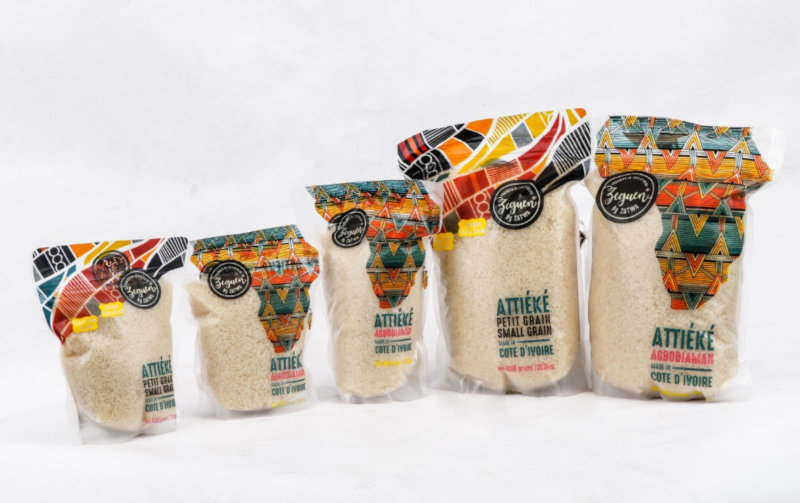Read in
Mohamed Diaby, founder of Citrine, at the company’s processing facility
Value addition has become the buzzword in agriculture as farmers and companies seek to process and package primary agricultural commodities into new products with an increased value.
Mohamed Diaby founded Côte d’Ivoire-based agri-processing company Citrine in 2018. He is also the founder of Zatwa, a firm that exports soft commodities to Europe. Both companies are located in Grand-Bassam, a town near Abidjan. He believes value addition is the way to navigate the competitive business of trading in food commodities because it raises margins and helps producers fetch higher prices.
Citrine processes and packages cassava couscous (attiéké), cassava dough (placali), ground cassava leaves and dried fruits. “We established the processing unit because trading in commodities was not adding value to raw material or our people,” Diaby says. While the company intends to eventually introduce additional products, including yam flour, cassava is its main focus because of its versatility and availability. Citrine’s strategy is to master and maximise value for one crop before moving to another.
Attiéké is an item found on most menus in Côte d’Ivoire. Made from fermented cassava that has been granulated and steamed, it replaces rice, wheat or potatoes in a meal. Placali is made by crushing cassava until it forms a sticky dough.
“In business, you can create something that never existed or take something that already exists and make it better. We are making better a product that already exists by packaging it for local and international markets,” says Diaby.
By focusing on quality and packaging to meet international standards, Citrine hopes to turn attiéké, placali and ground cassava leaves into intercontinental delicacies.
“We want to establish a long-term business in terms of quality and are focusing on our HACCP (Hazard Analysis Critical Control Point) certification as the first step,” Diaby says. HACCP is an internationally recognised method of identifying and managing food safety-related risks. The FDA describes it as a system where food quality is addressed through analysis and control of biological, chemical and physical hazards along the supply chain.
Mohamed Diaby, founder of Citrine, at the company’s processing facility.
Setting up Citrine cost $60,000, which came from the trading company Zatwa’s profits. While this was key in acquiring capital equipment, the company also approached banks and clients who gave advances to help start processing.
Having come from a background in finance and trading, Diaby’s first challenge was getting acquainted with the processing sector. “We lacked manufacturing expertise and had to search for the right information as there is a lack of research into the sector in the country. We called in favours and approached others for advice,” Diaby recalls.
Banks were hesitant to grant loans to newly established companies. “A friend recommended we first understand the environment and find out what financing we needed to avoid knocking on the wrong doors. If the risk appetite is close to zero, you have to make sure you are credible to attract financing. Most investors are not willing to take on risk, so start on your own first. If you have a million-dollar idea and you only have 500 dollars, how do you narrow down that idea to 500 dollars and grow it to 50,000 dollars, before you look for finance?” he advises.
Citrine’s products are available in European and US shops catering to the African diaspora. Exports account for 95% of the company’s turnover, while the remainder comes from sales via Ivorian supermarkets. In 2020, turnover was €100,000. The company currently exports one container of cassava products and dried fruit, respectively, each month.



